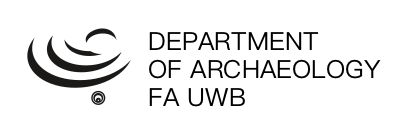
The bachelor's degree program in the Czech language provides a solid foundation in the field of archeology. Graduates will gain a complex knowledge of archaeological theory and methods and the systematics of archaeological sources in Bohemia and Moravia in the Central European context. They will understand the possibilities and limits of archaeological knowledge of the past based on material sources and will be familiar with basic issues related to settlement, livelihood and production, ritual manifestations and levels of technological knowledge in prehistory, antiquity and the Middle Ages. The degree program is divided into two specialization modules in which students either gain a deeper knowledge of museology, conservation and management of archaeological heritage or focus on the issue of death and funerary practices in the past and gain basic knowledge of biological anthropology. Graduates have the knowledge and skills that enable them to carry out partially independent professional work in the field research of archaeological monuments and their evaluation; they can carry out the documentation of immovable monuments and other activities in the field of archaeological preservation, and they take part in professional work in museum collections or in information systems data.
The majority of graduates are expected to continue their studies in the master's degree program, where they will deepen their knowledge of archeology and related fields. After acquiring a master’s degree, the graduates can work in the field, for example, in the position of field technicians or laboratory workers in organizations conducting archaeological research, in museums or monument institutions. Graduates will also apply practical knowledge of digital documentation methods (e.g. measuring techniques including the use of drones, 3D documentation of finds and reconstructions, virtual reality), information technologies and the basics of historical artifact conservation methods in a number of other professions outside archeology.
Acquired skills and knowledge:
The majority of graduates are expected to continue their studies in the master's degree program, where they will deepen their knowledge of archeology and related fields. After acquiring a master’s degree, the graduates can work in the field, for example, in the position of field technicians or laboratory workers in organizations conducting archaeological research, in museums or monument institutions. Graduates will also apply practical knowledge of digital documentation methods (e.g. measuring techniques including the use of drones, 3D documentation of finds and reconstructions, virtual reality), information technologies and the basics of historical artifact conservation methods in a number of other professions outside archeology.
Acquired skills and knowledge:
- The graduate knows the basics of the theory and methodology of contemporary archeology and understands the nature of archaeological sources.
- Has a basic knowledge of archaeological sources in the Czech lands from the Paleolithic to the present and historical context (Czech history); can chronologically define and describe the archaeologically documented artefact content of individual periods of prehistory, the Middle Ages, the Modern Age and modern times.
- Demonstrates knowledge of destructive and non-destructive archaeological field methods and post-excavation procedures.
- Is able to design optimal procedures for the preventive conservation of archaeological material and perform basic conservation treatment of selected groups of artifacts.
- Has knowledge of the organizational context and system of protection of archaeological heritage.
- Is familiar with the issues of legal legislation and management of archaeological conservation.
- Is familiar with the organization and systems of registration of museum collections of archaeological finds.
- Can write a professional text and is capable of professional oral presentation.
- Can analyze the archaeological context, field and laboratory research, has a mastery of the archaeological description of entities and also the synthesis and interpretation of archaeological data at the basic level.
- Is able to create a GIS map with content capturing archaeological site data and other related information.
- Under the supervision of the chief archaeologist, the graduate is able to conduct non-destructive field research at selected types of archaeological monuments (especially documentation of anthropogenic shapes in the landscape, monument care, surface collection of artifacts).
- Is able to work with remote sensing data (aerial and satellite imaging, aerial laser scanning).
- Is prepared to do field work in destructive archaeological research, including the management of a smaller section of research under the supervision of a chief archaeologist; has a mastery of excavation techniques and methods of documentation of archaeological situations, including the basics of surveying at archaeological sites.
- Has the skills necessary for interdisciplinary cooperation and is able to utilize methods from various fields of the natural sciences under the guidance of professional consultants.
- Can evaluate field documentation up to the level of a partial finding report and has mastered the basic procedures of laboratory treatment, methods for recording findings and is able to manage a smaller laboratory team.
- Is familiar with the procedures of the conservation of individual types of archaeological finds and is able to apply them in practice.
- Has an overview of the basic typological and chronological classification of archaeological monuments from prehistory to modern times.
- Can analyze a small set of movable artifacts using modern documentation and analytical tools.
- Has a mastery of the basics of work with archaeological finds in museum collections.
- Can work with the national information systems of archaeological monuments.
